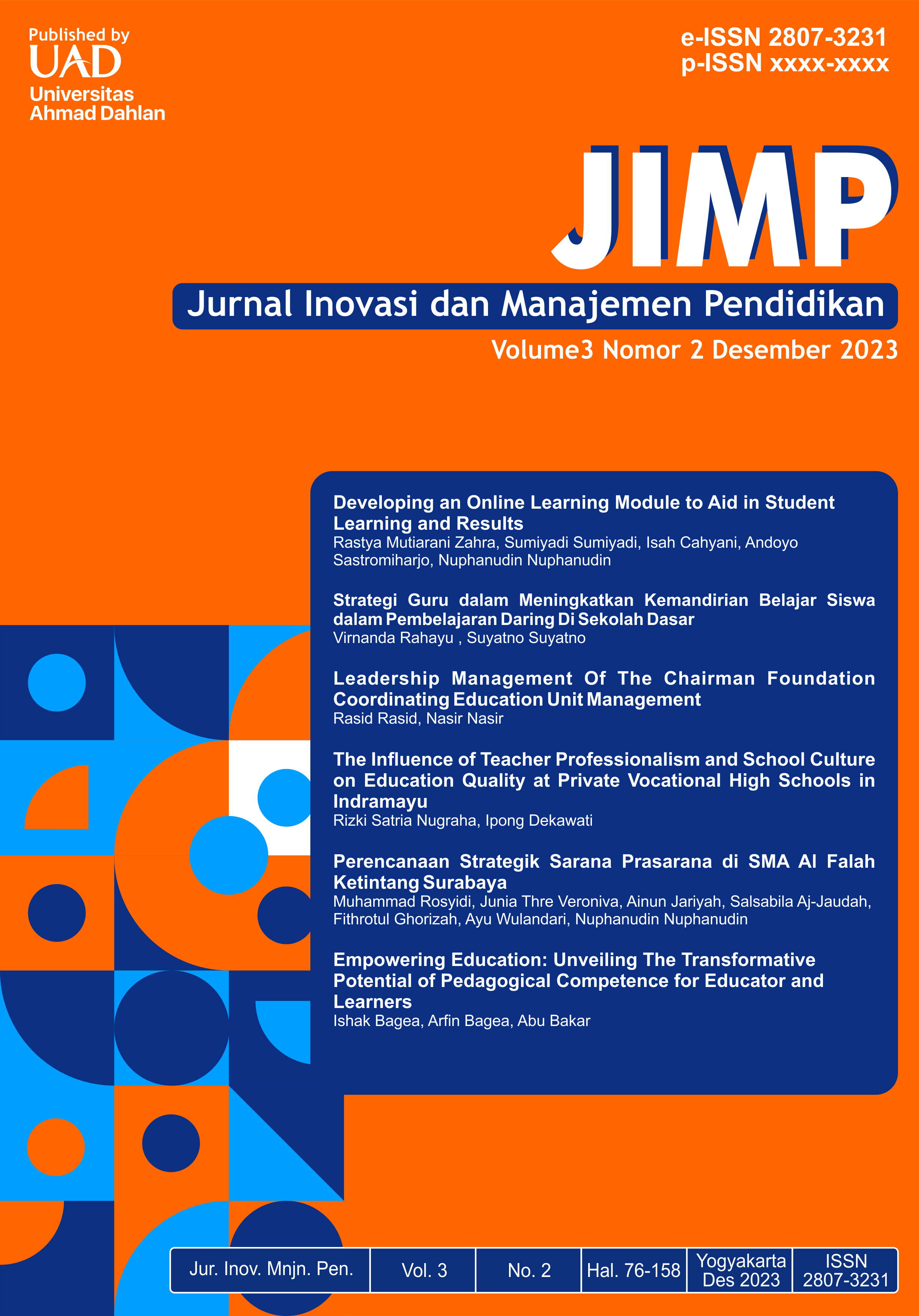Strategi Guru dalam Meningkatkan Kemandirian Belajar Siswa dalam Pembelajaran Daring Di Sekolah Dasar
DOI:
https://doi.org/10.12928/jimp.v3i2.7998Keywords:
Strategi guru, Kemandirian Belajar, Pembelajaran Daring, Teknologi informasiAbstract
Kemandirian belajar merupakan faktor penting dalam menentukan pembelajaran daring siswa. Seorang guru harus memiliki strategi yang inovatif dalam membantu kemandirian siswa dalam proses belajar. Penelitian ini bertujuan: 1) mendeskripsikan aspek-aspek kemandirian belajar siswa, dan 2) mengkaji strategi guru dalam meningkatkan kemandirian belajar siswa selama pandemi covid-19 di SD Muhammadiyah Suronatan Yogyakarta. Penelitian yang digunakan adalah penelitian kualitatif dengan pendekatan studi kasus. Subjek penelitian yaitu kepala sekolah, guru kelas, siswa dan orangtua. Teknik pengumpulan data yaitu wawancara, observasi, dan dokumetasi. Teknik analisis ini terdiri dari tiga kegiatan yaitu reduksi data, penyajian data, dan verifikasi atau pemeriksaan kesimpulan. Hasil penelitian menunjukkan bahwa: 1) kemandirian belajar di SD Muhammadiyah Suronatan dapat dibedakan menjadi kemandirian siswa dalam mengerjakan tugas, kemandirian siswa dalam beribadah, kemandirian siswa dalam membantu pekerjaan rumah, dan kemandirian siswa dalam mengikuti lomba-lomba yang ada diluar sekolah. 2) strategi guru dalam meningkatkan kemandirian belajar yaitu dilakukan melalui pemanfaatan teknologi informasi dalam pembelajaran, median pembelajaran inovatif, dan strategi pembelajaran interaktif.
References
Ardiawan, I. K. N., & Heriawan, I. G. T. (2020). Pentingnya Komunikasi Guru Dan Orang Tua Serta Strategi PMP Dalam Mendukung Pembelajaran Daring. Danapati: Jurnal Ilmu Komunikasi, 1(1), 95–105.
Astini, N. K. S. (2020). Tantangan dan peluang pemanfaatan teknologi informasi dalam pembelajaran online masa covid-19. Cetta: Jurnal Ilmu Pendidikan, 3(2), 241–255.
Astuti, S., Pramudiani, P., Masykuroh, K., & Ulfah, S. (2021). Sinergitas Guru Dan Orang Tua Dalam Integrasi Nilai Karakter Pada Pembelajaran Daring Di Masa Pandemi Covid-19. Jurnal Pendidikan Karakter, 1, 117–133.
Barseli, M., Ifdil, I., & Fitria, L. (2020). Stress akademik akibat Covid-19. JPGI (Jurnal Penelitian Guru Indonesia), 5(2), 95. https://doi.org/10.29210/02733jpgi0005
Barseli, M., Ifdil, I., & Nikmarijal, N. (2017). Konsep stres akademik siswa. Jurnal Konseling Dan Pendidikan, 5(3), 143–148.
Batoebara, M. U., & Hasugian, B. S. (2021). Peran orang tua dalam komunikasi pembelajaran Daring. Warta Dharmawangsa, 15(1), 166–176.
Campbell, S., Greenwood, M., Prior, S., Shearer, T., Walkem, K., Young, S., Bywaters, D., & Walker, K. (2020). Purposive sampling: complex or simple? Research case examples. Journal of Research in Nursing, 25(8), 652–661.
Creswell, J. W., & Creswell, J. D. (2017). Research design: Qualitative, quantitative, and mixed methods approaches. Sage publications.
Dewi, W. A. F. (2020). Dampak Covid-19 terhadap implementasi pembelajaran daring di Sekolah Dasar. Edukatif: Jurnal Ilmu Pendidikan, 2(1), 55–61.
Dumez, H. (2015). What is a case, and what is a case study? BMS Bulletin of Sociological Methodology/ Bulletin de Methodologie Sociologique, 127(1), 43–57. https://doi.org/10.1177/0759106315582200
Ekayani, P. (2017). Pentingnya penggunaan media pembelajaran untuk meningkatkan prestasi belajar siswa. Jurnal Fakultas Ilmu Pendidikan Universitas Pendidikan Ganesha Singaraja, 2(1), 1–11.
Etikan, I., Musa, S. A., & Alkassim, R. S. (2016). Comparison of convenience sampling and purposive sampling. American Journal of Theoretical and Applied Statistics, 5(1), 1–4.
Fauziyyah, R., Awinda, R. C., & Besral, B. (2021). Dampak pembelajaran jarak jauh terhadap tingkat stres dan kecemasan mahasiswa selama pandemi COVID-19. Jurnal Biostatistik, Kependudukan, Dan Informatika Kesehatan, 1(2), 113–123.
Fitriansyah, R., Fatinah, L., & Syahril, M. (2020). Critical review: professional development programs to face open educational resources in Indonesia. Indonesian Journal on Learning and Advanced Education (IJOLAE), 2(2), 109–119.
Gusty, S., Nurmiati, N., Muliana, M., Sulaiman, O. K., Ginantra, N. L. W. S. R., Manuhutu, M. A., Sudarso, A., Leuwol, N. V., Apriza, A., & Sahabuddin, A. A. (2020). Belajar mandiri: Pembelajaran daring di tengah pandemi Covid-19. Yayasan Kita Menulis.
Haryono, A. (2001). Belajar mandiri konsep dan penerapannya dalam sistem pendidikan dan pelatihan terbuka/jarak jauh. Jurnal Pendidikan Terbuka Dan Jarak Jauh, 2(2), 137–161.
Hasanah, H. (2017). Teknik-teknik observasi (Sebuah Alternatif Metode Pengumpulan Data Kualitatif Ilmu-ilmu Sosial). At-Taqaddum, 8(1), 21. https://doi.org/10.21580/at.v8i1.1163
Houghton, C., Murphy, K., Shaw, D., & Casey, D. (2015). Qualitative case study data analysis: An example from practice. Nurse Researcher, 22(5).
Huberman, A. M., & Miles, J. S. M. B. (2019). Qualitative data analysis: A methods sourcebook.
Huzaimah, P. Z., & Amelia, R. (2021). Hambatan yang dialami siswa dalam pembelajaran daring matematika pada masa pandemi covid-19. Jurnal Cendekia: Jurnal Pendidikan Matematika, 5(1), 533–541.
Indah, R. P., & Farida, A. (2021). Pengaruh Kemandirian Belajar Siswa Terhadap Hasil Belajar Matematika. Jurnal Derivat: Jurnal Matematika Dan Pendidikan Matematika, 8(1), 41–47. https://doi.org/10.31316/j.derivat.v8i1.1641
Istiningsih, E., Suyatno, S., & Widodo, W. (2020). Academic supervision to improve teachers’ readiness in utilizing information and communication technology in vocational high schools. Universal Journal of Educational Research, 8(10), 4365–4373. https://doi.org/10.13189/ujer.2020.081002
Jatira, Y., & Neviyarni, S. (2021). Fenomena Stress dan Pembiasaan Belajar Daring Dimasa Pandemi Covid-19. Edukatif: Jurnal Ilmu Pendidikan, 3(1), 35–43.
Khotijah, I., Kale, S., Bali, E. N., & Mundiarti, V. (2020). Peran Guru dalam Menanamkan Kemandirian Anak Saat Belajar di Rumah pada Masa Pandemi Covid 19. ECEDS: Early Childhood Education and Development Studies, 1(2).
Mallillin, L. L. D., Mendoza, L. C., Mallillin, J. B., Felix, R. C., & Lipayon, I. C. (2020). Implementation and Readiness of Online Learning Pedagogy: a Transition To Covid 19 Pandemic. European Journal of Open Education and E-Learning Studies, 5(2), 71–90. https://doi.org/10.46827/ejoe.v5i2.3321
Pamungkas, D. E., & Sukarman, S. (2020). Transformasi Dunia Pendidikan Di Sekolah Dasar Dalam Masa Pandemi Covid-19. Jurnal Review Pendidikan Dasar: Jurnal Kajian Pendidikan Dan Hasil Penelitian, 6(3), 211–219.
Patimah, E., & Sumartini, S. (2022). Kemandirian Belajar Peserta Didik Pada Pembelajaran Daring: Literature Review. Edukatif : Jurnal Ilmu Pendidikan, 4(1), 993–1005. https://doi.org/10.31004/edukatif.v4i1.1970
Prasetiyo, E., & Suyatno, S. (2021). The Implementation of Information Technology-Based Learning during Covid-19 Outbreak at Elementary School. Jurnal Inspirasi Pendidikan, 11(1), 28–40.
Riyadi, M. (2020). Pengaruh Pemberian Terapi Seni dengan Metode Menggambar Terhadap Penurunan Tingkat Stres Akademik pada Mahasiswa. Universitas Mercu Buana Yogyakarta.
Riyanti, Y., Wahyudi, W., & Suhartono, S. (2021). Pengaruh kemandirian belajar terhadap hasil belajar matematika siswa sekolah dasar. Edukatif: Jurnal Ilmu Pendidikan, 3(4), 1309–1317.
Seidman, I. (2006). Interviewing as qualitative research: A guide for researchers in education and the social sciences. Teachers college press.
Siagian, H., Pangaribuan, J. J., & Silaban, P. J. (2020). Pengaruh kemandirian belajar terhadap hasil belajar Matematika siswa di sekolah dasar. Jurnal Basicedu, 4(4), 1363–1369.
Sukmawati, R. A., Pramita, M., Purba, H. S., & Utami, B. (2020). The use of blended cooperative learning model in introduction to digital systems learning. Indonesian Journal on Learning and Advanced Education (IJOLAE), 2(2), 75–81.
Suyatno, S., Nuryana, Z., Mu’tafi, A., Iskarim, M., & Wu, F. K. (2021). Student Well-Being in Online Learning during the Covid-19 Pandemic: Voice in the Field. Turkish Online Journal of Qualitative Inquiry, 12(8), 235–251. https://doi.org/10.35542/osf.io/k9uxj
Suyatno, S., Sibawaihi, S., Wantini, W., Firdausi, D. K. A., & Patimah, L. (2023). Comparing the Experience of Pre-Service Teachers in the First and Final Semesters in Online Learning Using a Focus Group Study. The Qualitative Report, 28(4), 1230–1248.
Vijayan, R. (2021). Teaching and learning during the covid-19 pandemic: A topic modeling study. Education Sciences, 11(7). https://doi.org/10.3390/educsci11070347
Wantini, W., Suyatno, S., Siti Muthia, D., & Yusmaliana, D. (2022). Learning Model During Post Covid-19 Pandemic to Improve Early Childhood Language Development. Jurnal Obsesi: Jurnal Pendidikan Anak Usia Dini, 6(6), 6187–6197.
Widodo, L. S., Prayitno, H. J., & Widyasari, C. (2021). Kemandirian Belajar Matematika Siswa Sekolah Dasar melalui Daring dengan Model Pembelajaran Flipped Classroom. Jurnal Basicedu, 5(5), 3902–3911.
Widyaningsih, O. (2020). Penerapan Pembelajaran Online (Dalam Jaringan) di Sekolah Dasar. Jurnal Pendidikan Dasar, 2(2), 50–60.
Downloads
Published
How to Cite
Issue
Section
License
Copyright (c) 2023 Universitas Ahmad Dahlan

This work is licensed under a Creative Commons Attribution-ShareAlike 4.0 International License.
This article's copyright is transferred to Universitas Ahmad Dahlan (UAD) if and when the item is accepted for publication. The undersigned hereby transfers any rights in and to the paper including without limitation all copyrights to UAD. The undersigned hereby represents and warrants that the article is original and that he/she is the author of the paper, except for material identified as to its source, with permission notices from the copyright owners where required. The undersigned represents that he/she has the power and authority to make and execute this assignment.
We declare that:
This paper has not been published in the same form elsewhere.
It will not be submitted anywhere else for publication before acceptance/rejection by this Journal.
Copyright permission is obtained for materials published elsewhere and which require this permission for reproduction.
Furthermore, I/We hereby transfer the unlimited rights of publication of the above-mentioned paper in whole to UAD. The copyright transfer covers the exclusive right to reproduce and distribute the article, including reprints, translations, photographic reproductions, microform, electronic form (offline, online), or any other reproductions of similar nature.
The corresponding author signs for and accepts responsibility for releasing this material on behalf of any co-authors. This agreement is to be signed by at least one of the authors who have obtained the co-author(s) assent where applicable. After submission of this agreement signed by the corresponding author, changes of authorship or in the order of the authors listed will not be accepted.
Retained Rights/Terms and Conditions
Authors retain all proprietary rights in any process, procedure, or article of manufacture described in the Work.
Authors may reproduce or authorize others to reproduce the Work or derivative works for the author's personal use or company use, provided that the source and the UAD copyright notice are indicated, the copies are not used in any way that implies UAD endorsement of a product or service of any employer, and the documents themselves are not offered for sale.
Although authors are permitted to re-use all or portions of the Work in other works, this does not include granting third-party requests for reprinting, republishing, or different types of re-use.







